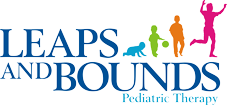Leaps and Bounds Therapy provides pediatric physical, occupational, and speech therapy services in your home servicing Chicago and the North suburbs.
What is Pediatric Physical Therapy?
Pediatric Physical Therapy is skilled services that a licensed physical therapist customizes to help babies and children of all ages learn to activate muscles of their body to move, and tolerate a variety of positions, to the best of their abilities to participate in daily activities.
- Gross Motor Development
- Stability & Mobility
- Strengthening & Stretching
- Balance & Coordination
What is Pediatric Occupational Therapy?
Pediatric Occupational Therapy is skilled services that a licensed occupational therapist customizes to help children gain independence, while also strengthening the development of fine motor skills, sensory motor skills, and visual motor skills that children need to function, attend, play and socialize.
- Fine Motor Development
- Visual Motor Development
- Motor Planning & Coordination
- Executive Functioning Skills & Self-Help
- Sensory Processing & Self-Regulation Skills
What is Pediatric Speech Therapy?
Pediatric Speech Therapy is skilled services that a licensed speech pathologist customizes to help children communicate effectively by assisting with the improvement of their verbal and non-verbal language skills in a play based manner. They also assist with feeding if a baby or child has feeding difficulties.
- Speech & Language Development
- Articulation
- Fluency
- Communication
- Social interaction skills

What We Offer:
-
Pediatric physical, occupational, and speech therapy services to babies and children in your home, child’s daycare, or child’s school.
-
Prompt evaluation and treatment services from the moment you call
-
Individualized and personalized treatment approaches to meet your child and family’s needs
-
Play based activities and strategies customized by a licensed physical therapist, occupational therapist and speech therapist
-
Team approach: our licensed therapists will encourage family members, caregivers, and teachers to be a part of the session.
Areas of Specialty:
Gross Motor Development
A generalized term to describe movements related to large muscles such a legs, arms, neck, core and trunk. Skills in children may include: lifting their head, crawling, sitting, standing, walking, running, jumping, navigating stairs in order to participate in home, school, and community environments.
Torticollis
A condition in which an infant’s head persistently tilts to one side and turns to one side.
Plagiocephaly
A condition in which specific areas of an infant’s head develop in a flattened shape and appearance. It can also affect symmetry of the face and is often seen with torticollis.
Gait abnormalities
When a person is unable to walk in a usual way. There are typical and atypical variations that can be clinically assessed by a licensed physical therapist to figure out the potential cause and any red flags.
Orthotic Intervention
Inserts that can be used to assist with flat feet, toe walking, weakness, locked knees, poor balance, frequent tripping, leg length discrepancies, etc. Proper assessment and referral can be made by one of our licensed physical therapists
Coordination
The ability to move efficiently, carefully, quickly, and purposefully. This often requires a child to have good motor planning and body awareness
Muscle Strength
How strong the child is (how much muscular force can be exerted) and muscular endurance is how long the child’s muscles can work at a time to tolerate a variety of positions and movements.
Balance
Having an even distribution of weight on each side of a vertical axis, but more simply, a child’s ability to not fall over.
Postural Control
A child’s ability to assume and maintain upright posture seated or standing without support. A child who has proper postural control can sustain this position without fatigue or compensations. Adequate postural control is needed for circle time, sitting at a desk, and engaged in play.
Hypotonia
Low muscle tone. A lack of resistance to passive movement. Also can be referred to as “floppy”.
Hypertonia
High muscle tone. Too much muscle tone so that arms or legs, for example, are stiff. Increased resistance to passive movement.
Orthopedic Conditions and Injuries
Injuries, diseases or conditions that affect the musculoskeletal system. These can be from trauma or congenital.
Brain and Neurologic Conditions
Injuries, diseases or conditions that affect the nervous system. The nervous system is composed of organs, principally the brain, spinal cord, nerves, and ganglia. These, in turn, consist of various tissues, including nerve, blood, and connective tissue.
Genetic Conditions
Conditions that occur due to a mutation in a gene in the body’s cells. Genetic conditions can be caused by a change to a single gene, many genes, or damage to the overall chromosomes that carry the genes. Some genetic conditions are hereditary, which means they are passed along from parent to child. Others can happen for the first time in a baby.
Motor planning
A child’s ability to organize, plan and then carry out new tasks. It is the first step in learning new skills and requires accurate information from all sensory systems of the body, and mature body awareness, pereption of movement and awareness of space. For children who demonstrate difficulty with motor planning, practice, repetition, and therapeutic intervention are key to success.
Fine Motor Development
The process of developing the ability to use the small muscles in your hands, fingers, wrists, and feet to make precise movements and manipulate objects. Children develop fine motor skills from birth to adulthood. Babies and toddlers need a lot of playtime and practice to develop these skills. These skills also help with hand-eye coordination.
Executive Functioning Skills
Sensory Processing
How our body takes in information through our senses (sight, hearing, touch, taste, smell, movement, and body position) and then uses it to interact with the world around us. Some people may have a unique sensory profile as they may be over responsive or under responsive to certain senses requiring strategies to be implemented to support them.
Speech & Language Development
A child’s ability to effectively communicate and understand in different environments. Language development includes attending and understanding in order to communicate.
Articulation
Refers to the ability to produce speech sounds using the tongue, lips, jaw, and the roof of your mouth, in order to produce clear and distinct sounds.
Fluency
Feeding Challenges
Address challenges with chewing, sucking, and swallowing food, often collaborating with other healthcare professionals like pediatricians and occupational therapists depending on the severity of the feeding issue.
